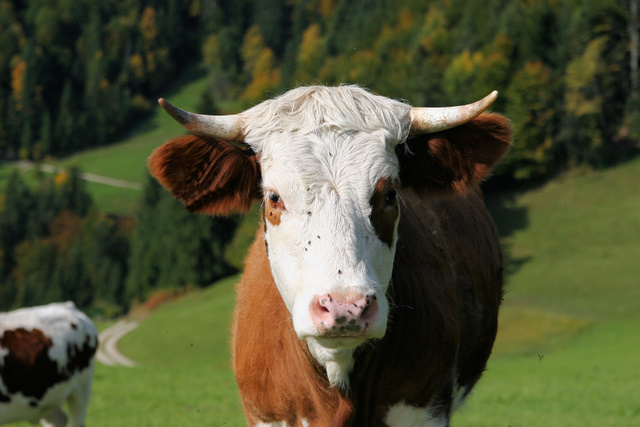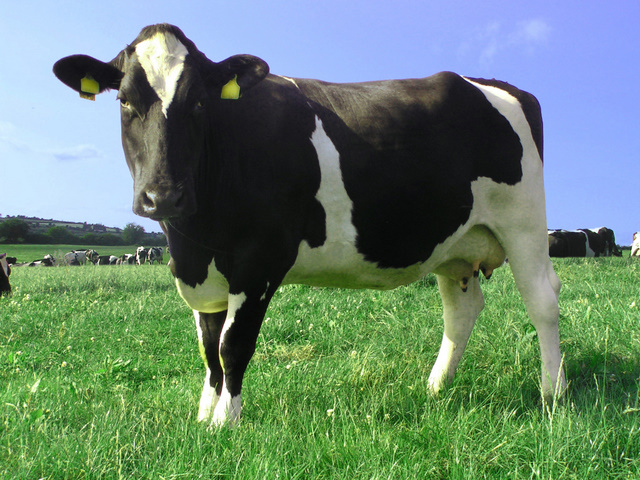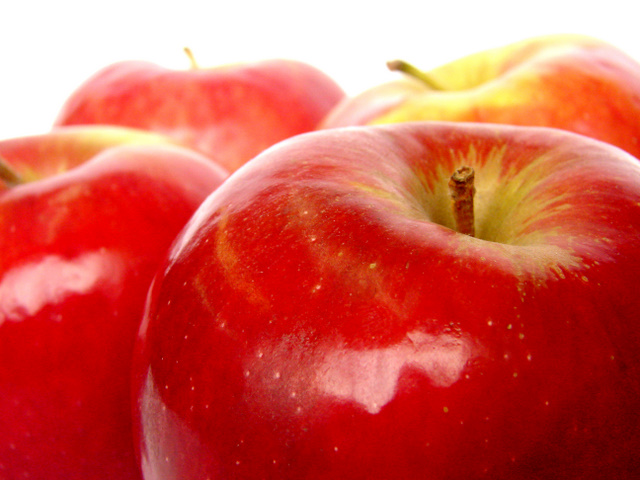You may have noticed that large supermarket chains are now making room on the shelves for grass-fed beef. You might have picked up a package of grass-fed beef, looked at the higher price tag, and quickly put it back down. So what? The cows get to eat grass. Why is that costing me so much more money and why shouldn’t I just stick with the other beef? Well, studies are showing that happier cows lead to healthier people.
This is the fifth in a monthly series on making small, incremental changes towards a healthier diet prompted by my lunch with Robyn O’Brien, author of The Unhealthy Truth. Just joining us this month and interested in completing the previous monthly challenges? Check out all posts from the series here.
Here in the United States we love our beef. Last year we consumed over 26 BILLION pounds of it.
To accommodate this insatiable demand for red meat, the beef industry has changed dramatically over the years, as has the chicken industry. Animals have been removed from their natural farm settings and moved to large factory operations. Cows are no longer left to graze on the grass around the farm but rather are kept penned in close quarters and given a diet of grain predominantly made up of corn and soy. The animals are given regular doses of anti-biotic to keep them as healthy as possible in unhealthy conditions.
This month I took a visit to a local farm here in South Jersey to talk with Carla, the owner of 7th Heaven Farm, and to take a look at how pastured animals are raised. Through my talks with Carla, what I observed on the farm, and the research I have done I found that there are some very compelling reasons to make a shift to grass-fed meats.
BENEFITS TO THE ANIMALS
1. Grass-fed cows have less stress
Consider how you feel while stuck on a crowded train or bus trying to commute to work or catch a ball game. Doesn’t feel too great, right? Animals that are confined to feedlots are unable to perform natural grazing activities. In contrast, the animals at 7th Heaven Farm are free to roam and graze. The sheep and goats graze along side chickens, guinea and pea fowl. The pigs forage, root, run and play. Mothers and babies are able to live together and the babies are given the choice of their mother’s milk, grass, or hay. All the animals are able to interact with each other and enjoy the attention from Carla and her family dog throughout the day.
2. Grass-fed cows require little to no pharmaceuticals to stay healthy
Animals that are allowed to graze naturally on the pasture are obtaining most, if not all of the nutrients they require. Animals on a high-grain diet can contract painful medical conditions that require significant doses of anti-biotic which, by the way, we end up ingesting when eating their meat or drinking their milk.
3. Grass-fed cows end their lives with dignity
Animals raised in grass-fed conditions are not taken to large slaughter houses when it is time for them to be processed. They are treated humanely and the farmers and ranchers do what they can to reduce the level of stress felt by the animal. Carla joked that “they are planning to build me a pew” at the processing facility to grieve for her animals since she typically sheds tears for each one she brings over. She also carefully watches the process to ensure it is done in a sanitary environment and with the animals in mind.
If you are a real animal lover like me, just reading or viewing the ways in which these animals are being treated would be enough to either lead you to spend a bit more for beef that has been humanely treated or to remove beef from your diet altogether.
But if that doesn’t motivate you to make a switch, perhaps this will.
Studies are finding that happier cows make healthier food for us.
BENEFITS TO US
1. Grass-fed beef is lower in saturated and total fat
Fat is one of the three important nutrients our bodies need to function properly (carbohydrate and protein are the other two). To remain healthy, we need to include some fat in our diet. However, not all fat is made equal. All fats are comprised of both saturated and unsaturated fatty acids. Saturated fat has been found to increase LDL (bad) cholesterol levels and increase the risk of heart disease while unsaturated or lean fat has been shown to lower LDL cholesterol.
Studies have found that cattle raised on a grass-fed diet produce leaner meat – meat that is equivalent to boneless chicken breast. However, Carla mentioned that the breed of the cow is also important. She particularly favors the Belted Galloway which she says can safely consume a 100% grass-fed diet and produces meat that is similar to chicken with respect to cholesterol and fat.
2. Grass-fed beef is higher in total omega-3s
Omega-3 fatty acids are a particular type of polyunsaturated fat. They are a necessary component of our diets but our bodies do not make them. Therefore, we must get these fatty acids from our diet. and many of us are not getting enough. Why are they so important? Omega-3 fatty acids have been found to reduce the risk of heart disease and aid in lowering blood pressure. They are also important for proper brain function and have been shown to reduce the risk of depression, Alzheimer’s, ADD, and schizophrenia.
3. Grass-fed beef is higher in vitamin E
Vitamin E is a fat-soluble nutrient that aids the body in reducing the damage of free radicals. Free radicals are atoms or molecules that form in our bodies and can damage cells. While free radicals can be created due to normal chemical changes occurring in a cell, they can also be increased by external forces like smoking, radiation, and pollution. Vitamin E helps to prevent cell damage by acting as an anti-oxidant.
This Month’s Change: Switch to Grass-Fed Beef
Yes, grass-fed meat can be more expensive. If this month’s change has you concerned about pushing the limits on your budget, start small. Make a commitment to only buy ground beef that has been grass-fed and then slowly work your way into other cuts of meat. Or if you eat red meat 5 times per month, choose to buy grass-fed beef on one of those five occasions.
You might also consider looking into local farms like 7th Heaven Farm and comparing their prices to those in the supermarket. If you have enough space in your freezer, buying in bulk could save you some money.
Ready to take the plunge?
Tell us about your progress in the comments!





Great post! SO interesting. I dont know if they have grass fed beef here in Beer Sheva. I will have to make sure to check it out.
Thanks Beth Michelle! Glad it was helpful. I would love to hear what you find out about grass-fed meat in Israel!
I only buy my meat at Whole Foods because I know they only sell humanely raised animals. I always thought they were all grass fed, but recently learned that you have the option of either paying more for exclusively grass fed or less for grass fed but “vegetarian grain-finished” I have bought the latter figuring it was OK. What do you think?
Great question! Grain-finished cows are allowed to graze on grass at the beginning of their lives and then are brought to feedlots where they are given a grain diet. The reason cows are grain-finished is to fatten them up quickly and give the meat more fat. 100% grass-fed cows tend to be leaner and take longer to get to the proper weight. I am truly no expert in the topic but in my conversations with Carla from 7th Heaven Farms she indicated that the breed of cow is also important when it comes to grass-fed beef. Certain breeds really need to have some grain added to their diets in order to get the proper nutrition they require while others can do fine just grazing on grass. She uses the Belted Galloway which can be 100% grass-fed and creates meat that is as lean as chicken.